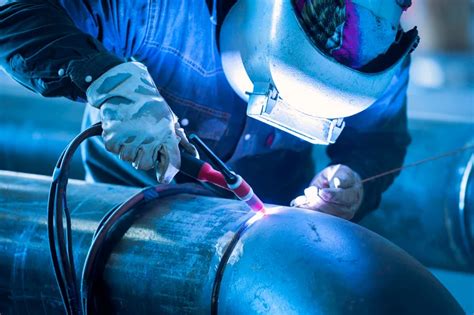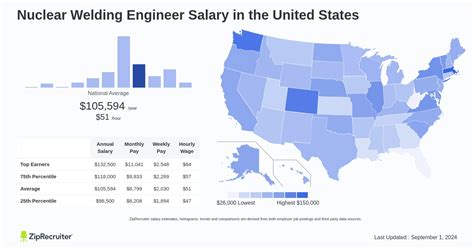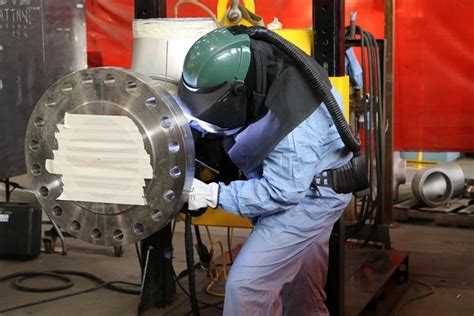A career as a nuclear welder is not just a job; it's a commitment to precision, safety, and powering the nation. This high-stakes profession combines elite craftsmanship with the immense responsibility of working within one of the world's most regulated industries. For those who can meet the challenge, the rewards are significant. A qualified nuclear welder can expect a salary ranging from $65,000 to well over $120,000 per year, with specialized contractors earning even more.
This article provides a data-driven look at what a nuclear welder earns, the factors that drive their salary, and the long-term outlook for this critical profession.
What Does a Nuclear Welder Do?

A nuclear welder is a highly skilled artisan who specializes in welding metals and alloys within nuclear power plants, nuclear-powered naval vessels (like submarines and aircraft carriers), and nuclear research facilities. Their work is subject to the most stringent quality standards in the world because a single flawed weld could have catastrophic consequences.
Key responsibilities include:
- Precision Welding: Performing complex welds on pipes, pressure vessels, reactor components, and structural supports that contain or support nuclear materials.
- Code Compliance: Adhering to exacting codes and standards, primarily from the American Society of Mechanical Engineers (ASME) and the Nuclear Regulatory Commission (NRC).
- Inspection and Testing: Working alongside inspectors to perform non-destructive testing (NDT) like X-rays and ultrasonic tests to ensure every weld is 100% free of defects.
- Maintenance and Repair: Playing a critical role during plant shutdowns (outages) to repair and upgrade existing systems, often in challenging and confined spaces.
This is a zero-defect environment where every action is documented and every weld is a testament to skill and focus.
Average Nuclear Welder Salary

While the U.S. Bureau of Labor Statistics (BLS) groups all welders together, the specialization of nuclear welding commands a significant salary premium. The BLS reports the median annual wage for all Welders, Cutters, Solderers, and Brazers was $50,460 in May 2023.
However, data from salary aggregators that track this specific specialization paints a much more lucrative picture.
- According to Salary.com, the average nuclear welder salary in the United States is approximately $85,570 per year, with a typical range falling between $66,975 and $106,660.
- Glassdoor reports a similar average salary of around $88,000 per year, with top earners and contractors potentially exceeding $130,000 when factoring in overtime and specialized outage work.
It's important to note that many experienced nuclear welders work as contractors, especially during planned refueling outages. These "road warriors" often earn very high hourly rates (e.g., $40-$70+ per hour) plus per diem allowances, pushing their annual income well into the six figures.
Key Factors That Influence Salary

Your earning potential as a nuclear welder isn't a single number; it's a range influenced by a combination of critical factors.
###
Level of Education and Certifications
While a four-year degree is not required, extensive training and certification are non-negotiable. A high school diploma or GED is the starting point, followed by:
- Vocational/Technical School: A diploma or associate degree in welding technology provides the foundational skills.
- Apprenticeships: Union or company-sponsored apprenticeships offer invaluable on-the-job training.
- Certifications: This is where welders truly increase their value. Key certifications include those from the American Welding Society (AWS), such as the Certified Welder (CW) and, for senior roles, the Certified Welding Inspector (CWI). Most importantly, nuclear welders must be "coded" or certified to specific procedures, such as the ASME Boiler and Pressure Vessel Code, Section IX. The more codes and welding positions you are certified for, the higher your earning potential.
###
Years of Experience
Experience is arguably the single most important factor. The trust required to work on critical reactor components is earned over years of flawless performance.
- Entry-Level (0-3 years): An apprentice or junior welder will likely start in the $55,000 to $70,000 range. They will perform less critical welds under strict supervision while learning the complex procedures and safety culture.
- Mid-Career (4-10 years): With a proven track record, these professionals are trusted with more complex systems. Their salaries typically range from $75,000 to $95,000. They are proficient in multiple welding processes and have a deep understanding of nuclear codes.
- Senior/Master (10+ years): These are the experts. They handle the most difficult welds, mentor junior welders, and may move into inspection or supervisory roles. Their base salaries often exceed $100,000, and with overtime or outage contract work, their total compensation can be much higher.
###
Geographic Location
Salary is heavily influenced by the location of nuclear facilities. States with a high concentration of nuclear power plants, naval shipyards, or national laboratories will have higher demand and often higher pay. Key states include:
- South Carolina, Illinois, and Pennsylvania: These states have the highest number of operating nuclear reactors.
- Virginia and Connecticut: Home to major naval shipyards (Newport News Shipbuilding and General Dynamics Electric Boat) that build and maintain the nuclear fleet.
- Washington and Tennessee: Locations of major federal sites like the Hanford Site and Oak Ridge National Laboratory.
Salaries in these regions are often higher to attract top talent and may be adjusted for the local cost of living.
###
Company Type
Who you work for matters. The pay structure and benefits can vary significantly between employers.
- Utility Companies: Working directly for a power generation company like Duke Energy or Dominion Energy often provides stable, long-term employment with excellent benefits and a structured salary progression.
- Defense Contractors: Companies like Huntington Ingalls and General Dynamics offer competitive salaries and are focused on naval contracts. These jobs require high-level security clearances.
- Maintenance & Construction Contractors: Firms like Bechtel or specialized outage service companies hire welders for specific projects or maintenance seasons. While employment may be less permanent, these roles often offer the highest hourly wages and per diems to compensate for travel and project-based work.
###
Area of Specialization
Within nuclear welding, further specialization can boost your pay. Welders who master difficult processes like Gas Tungsten Arc Welding (GTAW or TIG), which is used for high-purity pipe welding, are in constant demand. Those who are also skilled pipefitters can command an even greater premium, as the ability to both fit and weld complex piping systems is incredibly valuable. Specializing in specific alloys, such as Inconel or stainless steel, also increases marketability.
Job Outlook

The BLS projects a modest 2% growth for the general welding profession through 2032, which is slower than the average for all occupations. However, this statistic does not capture the reality of the highly specialized nuclear field.
The demand for *qualified* nuclear welders is expected to remain strong and stable. This is driven by two key factors:
1. Maintaining an Aging Fleet: The existing fleet of U.S. nuclear reactors requires constant maintenance, upgrades, and life-extension projects to continue operating safely.
2. A Retiring Workforce: A significant portion of the current skilled nuclear workforce is approaching retirement age, creating a skills gap that needs to be filled by a new generation of welders.
The high barrier to entry—due to the intense training, background checks, and psychological screening—means there is never a surplus of qualified candidates. For those who can achieve the necessary qualifications, job security is exceptionally high.
Conclusion

Pursuing a career as a nuclear welder is a path for the dedicated and the detail-oriented. It requires a significant upfront investment in training and a relentless focus on quality. However, the returns on that investment are clear and substantial.
Key Takeaways:
- High Earning Potential: Expect a salary significantly above the average for general welders, with a clear path to a six-figure income.
- Experience is King: Your salary will grow directly with your years of proven, high-quality work.
- Certifications are Your Currency: Mastering specific codes and welding processes is essential for career advancement.
- Stable and Secure: Despite broad industry trends, the niche demand for nuclear-grade skills ensures a stable and secure career outlook.
For individuals with steady hands, a sharp mind, and an unwavering commitment to excellence, a career as a nuclear welder offers not only financial security but also the profound satisfaction of powering communities and protecting national security.
